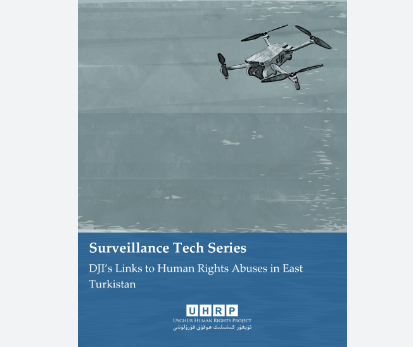March 5, 2024, UHRP
A Uyghur Human Rights Project briefing by Nuzigum Setiwaldi, the third in a UHRP series examining the role of surveillance technology and its impact on Uyghurs in East Turkistan. Read our press statement on the briefing; download the full briefing in English; and read UHRP’s first two briefings in the series focusing on Hikvision and Dahua.
I. Key Takeaways
- DJI is the world’s largest drone maker, producing drones worth billions of dollars each year.
- The company is a major supplier of camera drones and other products to 43 countries globally, including the US, UK, and Australia. DJI drones are widely used by governments, businesses, and individuals, ranging from photographers and filmmakers to public safety agencies, and police and military forces.
- DJI drones make up over half of the drones sold in the US and make up nearly 80 percent of the US consumer drone market. In 2020, DJI drones accounted for 90 percent of drones used by public safety agencies in the US and a significant number of the drones used by police forces in the UK and Australia.
- Although DJI is a privately held company, it has received investments from state-owned enterprises in China and is classified as a “Chinese military company” by the US Department of Defense.
- DJI is directly involved in mass surveillance schemes in East Turkistan and has supplied public security agencies with tools to surveil and target Uyghurs, Kazakh, and Kyrgyz people.
- Multiple governments have imposed trade restrictions on DJI, but nevertheless, government agencies, businesses, and consumers are still buying DJI drones.
- Despite marketing its products as tools to “save lives and benefit society,” DJI is directly facilitating genocidal crimes and should be subject to comprehensive sanctions, including procurement bans, export bans, and investment bans. Retailers should immediately stop selling DJI drones to consumers.

II. About DJI
Shenzhen DJI Innovation Technology Company Limited (DJI) (Ch. 大疆创新科技有限公司 Dajiang chuangxin keji youxian gongsi) is the world’s largest drone maker, shipping to consumers, businesses, and governments around the world. Based in Shenzhen, China, DJI is an acronym for Dajiang Innovations.
DJI was founded in 2006 by Frank Wang (Wang Tao) who started out selling drone control systems.1 DJI is not publicly traded and classifies itself as a “privately owned and operated company.”2 DJI is 100 percent owned by iFlight Technology Company Limited (Ch. 智翔科技有限公司 Zhixiang keji youxian gongsi), which is headquartered in Huizhou City, China.3 DJI does not publicly disclose a full list of its investors and denies receiving any investments from the Chinese government.4 However, reports show DJI has received funding from state-owned enterprises including Central Huijin Investment Co. Ltd., and China Baowu Steel Group Corporation Ltd.5 Four Chinese state funds have also invested in DJI: China Chenton Holdings Group, Shanghai Venture Capital Guidance Fund, Guangdong Hengjian Investment Holding, and SDIC Unity Capital.6 DJI maintains that “shareholders other than the founders do not participate in the company’s management and operation.”7 The US Department of Defense has considered DJI a “Chinese military company” since October 2022.8
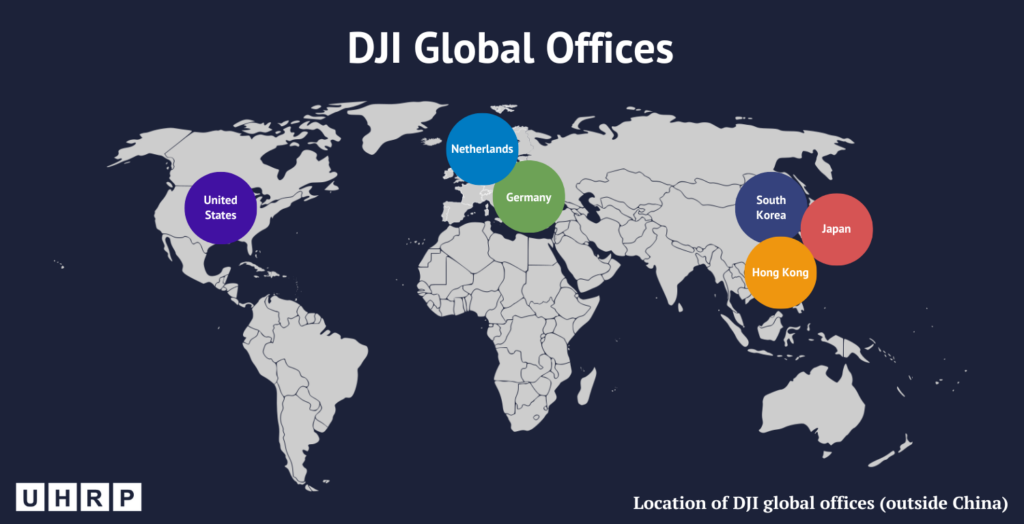
DJI manufactures camera drones, stabilization systems, and remote operation systems across several fields, including agriculture, automotive, and public safety and security. DJI also offers courses in drone flight training, aerial photography, and surveying and mapping at over 300 training sites in 44 countries, including at a DJI Academy in Fort Lauderdale, Florida, offering a “DJI Unmanned Aircraft System Operator” certificate.9
DJI is the world’s largest drone manufacturer and currently accounts for over 70 percent of the global drone market.10 According to Drone Industry Insights, the global drone market was valued at US$30.6 billion in 2022 and was expected to double by 2030.11 DJI was worth over US$25.6 billion (Ұ166 billion) in October 202012 compared to just US$15 million (Ұ107 million) in 2018.13 DJI does not disclose any details about its revenues on its website.

III. Global Markets
DJI is a major supplier of drone surveillance equipment worldwide. DJI is headquartered in Shenzhen and has offices in Beijing, Shanghai, Hong Kong, the US (Los Angeles), Germany (Frankfurt), The Netherlands, Japan (Tokyo), and South Korea.14 DJI operates multiple manufacturing centers in Shenzhen and also runs R&D centers in Shenzhen, Hong Kong, and Palo Alto, California focusing on software development.15
The company has an official online store and app where it sells camera drones and other products in 43 countries across Asia Pacific, Europe, and North America.16 A number of major retailers carry DJI products in-store and online globally, including Apple, Amazon, Best Buy, Costco, Micro Center, Sam’s Club, and Walmart.17 DJI also operates a “flagship store” in Miami, Florida, which opened in 2016.18
DJI is the world’s largest drone manufacturer and currently accounts for over 70 percent of the global drone market.
DJI products are used widely in the US by both consumers and government agencies. Currently, over 50 percent of drones sold in the United States are made by DJI (followed by Chinese group Autel), according to Drone Analyst.19 According to Drone Industry Insights, in 2020, DJI accounted for more than three-quarters (77 percent) of the US consumer drone market.20
In 2022, the Wall Street Journal reported a Freedom of Information Act request showing that nearly 66 percent of drones used by the Agricultural Research Service are made by DJI. The Department of Agriculture research division reportedly bought DJI drones in late 2020.21 It was reported in 2021 that over 900 public safety agencies, including the NYC and Boston police departments used DJI drones, and the National Park Service used them to fight wildfires in California.22 A Bard College study published in March 2020 found that in 2020, DJI drones made up approximately 90 percent of the drones used by public safety agencies including police, fire, and emergency services.23 In 2020, DJI delivered 100 drones to 40 police, fire, and public safety agencies in 22 US states to assist with their COVID response.24
DJI drones account for over 66 percent of drones used by UK police forces.
Thirty-seven police forces reported using 337 drones, at least 230 of which were made by DJI. Eleven police forces refused to provide details about the companies supplying their drones.25 The UK Ministry of Defence published a contract notice detailing an order for DJI drones and accessories worth £132,337 (US$168,000) in March 2023.26 The Ministry of Defence had previously paused purchases from DJI, but this order seems to be the first order made public since DJI was banned by the US government in 2020.
In February 2023, the Daily Telegraph in the UK reported DJI drones account for over 66 percent of drones used by UK police forces, according to police data obtained under the Freedom of Information Act.27 The UK Ministry of Defence published a contract notice detailing an order for DJI drones and accessories worth £132,337 (US$168,000) in March 2023.28 The Ministry of Defence had previously paused purchases from DJI, but this order seems to be the first order made public since DJI was banned by the US government in 2020.
Australians had purchased hundreds of thousands of drones made by DJI as of early 2023, primarily for private use.29 Commonwealth agencies and government departments have also bought thousands of DJI products.30 These include the Commonwealth Scientific and Industrial Research Organisation (CSIRO), Australian Federal Police, Services Australia, the Department of Defence, the offices of the Prime Minister and Cabinet, the Climate Change and Energy Department, the Australian Broadcasting Corporation (ABC), the Department of Home Affairs, and the Great Barrier Reef Marine Park Authority.31 According to The Australian, state police forces in Western Australia, Queensland, New South Wales, Victoria, and Tasmania have also purchased drones from DJI,32 and the Australian Defence Force has reportedly used hundreds of drones for training and military exercises.33

IV. Human Rights Violations
DJI is also a major provider of surveillance technology in China, particularly in the Uyghur Region where it has collaborated with the Chinese government to tailor its products to precisely serve the Chinese authorities’ agenda of tracking and surveilling Uyghur, Kazakh, and Kyrgyz people in East Turkistan. Many governments have declared that the human rights abuses in the region, including systematic discrimination, arbitrary detention, and forced labor, amount to genocide.
The United Nations has also found that these violations may constitute crimes against humanity, which is enabled to a large extent by the surveillance capabilities provided by companies like DJI. The UN Special Rapporteur on Human Rights and Counter-Terrorism highlighted DJI’s partnership with Xinjiang Public Security Bureau in their latest report on intrusive and high-risk surveillance technologies to the Human Rights Council in March 2023.34
In 2017, DJI entered into a partnership with the Xinjiang Public Security Department on public security projects for 2017-2018.35 DJI delivered drones to local public security agencies in the Uyghur Region. According to Bloomberg, DJI posted a statement about this partnership in 2017 on its website and social media but later deleted it after requests for comment.36
DJI delivered drones to local public security agencies in the Uyghur Region. According to Bloomberg, DJI posted a statement about this partnership in 2017 on its website and social media but later deleted it after requests for comment.
Xinjiang police and other local authorities are still buying products from DJI. Xinjiang public security departments entered into seven procurement orders with DJI that were worth nearly US$300,000 between 2019 and 2022, which included orders for DJI drones in Aksu worth US$132,000 and in Karamay worth US$75,000. Other documents show tenders worth US$47,000 for DJI drones for the Xinjiang Production and Construction Corps, or Bingtuan, a state paramilitary and corporate organization known to operate internment camps and forced labor programs.37
A DJI drone was used to film the video uploaded to YouTube in September 2019 showing hundreds of blindfolded and shackled men outside a train station in the Uyghur Region.38 In the video, dozens of police officers appear to be transferring the men from a detention center in Kashgar to facilities in Korla.39
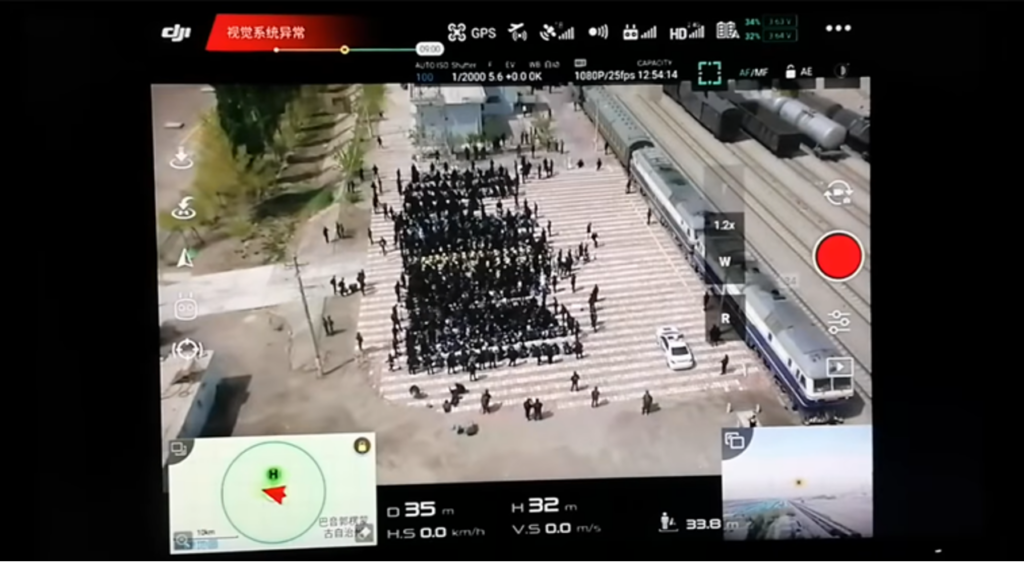
DJI has a story on its website featuring a Uyghur training program in 2018. The story states Aburimiti received training to start an “aerial application” business and volunteered free aerial services in Aksu, as part of the state “poverty alleviation” program.40 Although the story appears on the DJI website, its language, style, and content are identical to Chinese propaganda touting its program, which has intensified under the current genocidal policies, to transfer millions of Uyghurs to new job placements. Despite DJI’s denials of involvement in state policies, as noted below, this material from DJI’s English website highlights its cooperation in state programs, even beyond supplying technology to policing agencies.

V. DJI Statements
Human rights researchers and activists have confronted DJI over supplying the Chinese government with the technology to target and incriminate Uyghurs. However, DJI has completely denied any links to human rights abuses in East Turkistan, with Adam Welsh, DJI’s head of global policy, saying in a statement: “We’ve stated unequivocally that we have had nothing to do with the treatment of Uighurs in Xinjiang.”41
Moreover, DJI has dismissed cybersecurity concerns raised by governments. The company has always denied that it’s a military company and insists it only markets and sells its products for civilian use. It also maintains that it does not collect data and that its drones’ cyber security has been audited and tested by multiple firms and government agencies.42
More recently in November 2023, DJI claimed that a proposed bill in the US Congress, the American Security Drone Act “limits market choice or bans technology based on country of origin” and negatively impacts small companies as well as organizations using their drones for safety.43 DJI made a similar statement in 2020 when the US Department of the Interior decided to ground its drones over cybersecurity concerns. DJI stated that the move was “politically motivated country-of-origin restrictions masquerading as cybersecurity concerns.”44
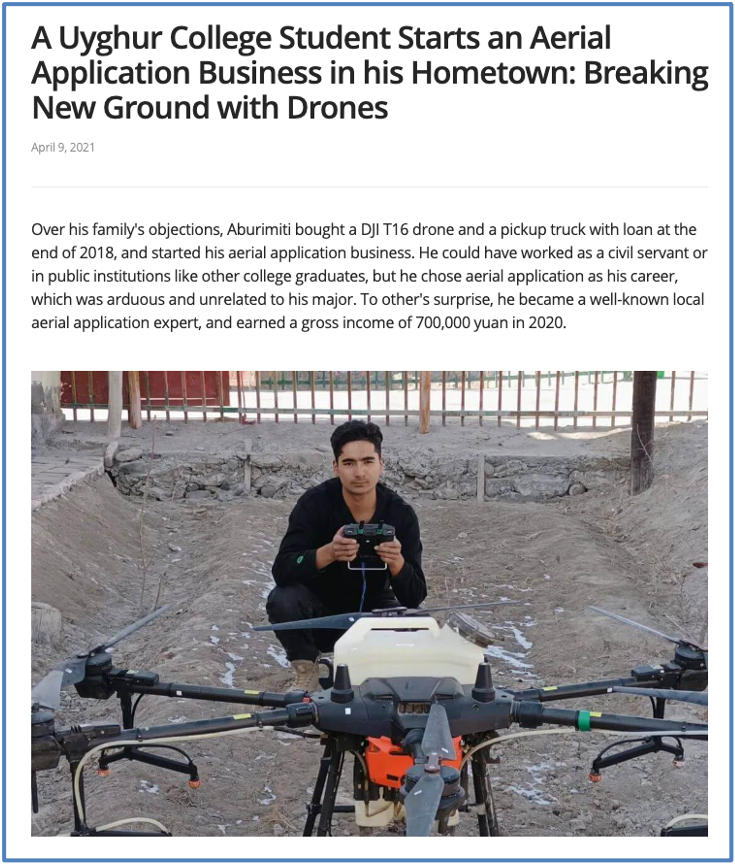
Photo: A story on the DJI website highlights its participation in the state’s “poverty alleviation” program, a key feature of the policies targeting Uyghurs.
In 2023, after the Chinese government duly announced an export control policy in response, restricting the export of certain drone equipment due to China’s own national security concerns, DJI stated it has “never designed and manufactured products and equipment for military use, nor have we ever marketed or sold our products for use in military conflicts or wars in any country.”45
In October 2022, DJI refuted its inclusion in the National Defense Authorization Act (NDAA) as a “Chinese military company” operating in the US. Similarly, when it was placed on the Commerce Department’s Entity List in 2020, DJI released a statement claiming: “DJI has done nothing to justify being placed on the Entity List. We have always focused on building products that save lives and benefit society.” DJI declined to provide any comment when the US Department of the Treasury added it to their investment blacklist.46
DJI marketing continues to insist that its products help communities while denying its role in Chinese government surveillance as part of the genocide crimes in the Uyghur homeland.
VI. Government Sanctions
Multiple governments have imposed trade restrictions on DJI given the prevailing human rights and security concerns associated with the drone manufacturer.
In August 2017, the US Army issued guidance banning the use of DJI devices and applications “due to increased awareness of cyber vulnerabilities associated with DJI products.”47 In May 2018, the US Department of Defense banned the sale and use of commercial off-the-shelf drones due to concerns over cybersecurity threats.48
Multiple governments have imposed trade restrictions on DJI given the prevailing human rights and security concerns associated with the drone manufacturer.
In 2019, the US Congress passed legislation banning the Pentagon from buying and using drones manufactured in China.49
In May 2019, the US Department of Homeland Security also raised concerns about the cybersecurity risk of drones made by an authoritarian state.50
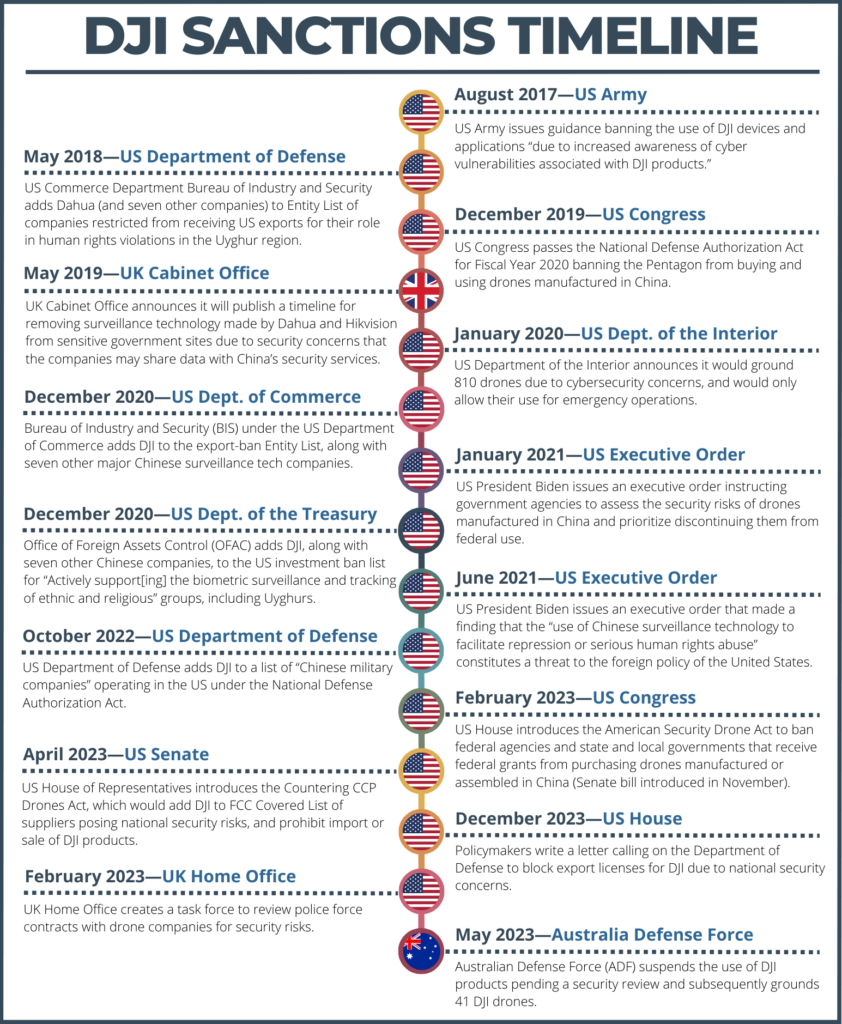
In January 2020, the US Department of the Interior announced it would ground 810 drones due to cybersecurity concerns, and would only allow their use for emergency operations.51 The Department of Defense and intelligence agencies have stated they would assist in reviewing and addressing cybersecurity concerns.52
DJI stated it was “disappointed” with the grounding orders, stating they had “little to do with security and are instead part of a politically motivated agenda to reduce market competition and support domestically produced drone technology.”53
In December 2020, the Bureau of Industry and Security (BIS) under the US Department of Commerce added DJI to the export-ban Entity List, along with seven other major Chinese surveillance tech companies.54 The companies were added to the list for “Enabl[ing] wide-scale human rights abuses within China through abusive genetic collection and analysis or high-technology surveillance, and/or facilitated the export of items by China that aid repressive regimes around the world.”55
The BIS Entity List restricts US companies from selling technology to these companies unless they have applied for and received a Commerce Department license to do so.56 The ban included parts and components that had previously been used for developing drones and other surveillance products in the US.
In January 2021, US President Biden issued an executive order instructing government agencies to assess the security risks of drones manufactured in China and prioritize discontinuing them from federal use.57
In December 2021, the Office of Foreign Assets Control (OFAC) under the US Department of the Treasury added DJI, along with seven other Chinese companies, to the US investment ban list. The eight companies were added for “Actively support[ing] the biometric surveillance and tracking of ethnic and religious” groups, and in particular the tracking of Uyghurs in East Turkistan. The ban means that “US persons will be prohibited from purchasing or selling certain publicly traded securities connected with these entities” under President Biden’s Executive Order 13959.58 In the June 2021 Executive Order, the President made a finding that the “use of Chinese surveillance technology to facilitate repression or serious human rights abuse” constitutes a threat to the foreign policy of the United States.59
In October 2022, the US Department of Defense added DJI to a list of “Chinese military companies” operating in the US under the National Defense Authorization Act.60
In April 2023, the House of Representatives introduced the Countering CCP Drones Act, which would add DJI to the Federal Communications Commission’s (FCC) Covered List of suppliers posing national security risks.61 The proposed bill would prohibit all imports or sales of DJI products, including video surveillance equipment and services.62 The list currently includes Hikvision, Dahua, Huawei, and ZTE.63 FCC Commissioner Brendan Carr previously called for DJI to be added to this list, specifically referencing the Treasury Department’s investment ban on DJI due to its role in the surveillance of Uyghurs in East Turkistan.64
The Senate introduced a similar bill in February 2023 (House in November 2023), that would ban federal agencies and state and local governments that receive federal grants from purchasing drones manufactured or assembled in China.65
In December 2023, policymakers wrote a letter calling on the Department of Defense to block export licenses for DJI due to national security concerns.66 In response, DJI stated that they “strongly deny any allegations against DJI regarding human rights.”67
In February 2023, the UK Home Office created a task force to review police force contracts with drone companies for security risks.68
In May 2023, the Australian Defense Force (ADF) suspended the use of DJI products pending a security review and subsequently grounded 41 DJI drones.69 The department had previously banned DJI drones for two weeks in 2017 at around the same time as the US Department of Defense’s ban.70 (The ADF has already removed Hikvision and Dahua products.)

VII. Conclusion
DJI is heavily implicated in mass surveillance in East Turkistan and is still contributing to the genocide and crimes against humanity today. Some governments have moved to review their contracts with DJI and phase their products out completely due to human rights and security concerns. On top of federal bans by the Departments of State, Interior, and Defense, four state governments in the US have banned DJI drones: Arkansas, Florida, Mississippi, and Tennessee.71
DJI’s share of the global commercial drone market fell 15 percent in 2021 after the US government imposed Treasury and Commerce sanctions.72 However, these efforts have been slow and difficult to implement. Even after DJI products were prohibited in 2021, US federal agencies including the Secret Service, were still using DJI drones.73 In Maryland and New York, law enforcement agencies were still using DJI drones in 2023.74 In the UK and Australia, police forces also purchased DJI drones in 2023.
DJI is heavily implicated in mass surveillance in East Turkistan and is still contributing to the genocide and crimes against humanity today.
It is unclear today how much DJI equipment is still being used in government and public spaces in the US, UK, and Australia. However, it appears as though DJI continues to pose serious ethical and security risks for governments using its products.
DJI drones are still available for sale to businesses and consumers in the US, unlike products from Huawei. DJI is still the top choice for drones in the US, putting businesses, retailers, and consumers using DJI products at risk of being complicit in the egregious human rights violations in the Uyghur Region.

VIII. Recommendations
UHRP calls on governments to impose comprehensive human rights sanctions on DJI and all surveillance companies operating in the Uyghur Region, including:
- Export bans on components for surveillance systems
- Procurement bans for taxpayer-funded surveillance systems
- Investment bans on capital flows to these companies

IX. About the Author
Nuzigum Setiwaldi is a campaign manager with the Coalition to End Uyghur Forced Labour and a content manager with USAHello. She holds a degree in sociology and is interested in human rights research and immigrant rights.

X. Acknowledgements
The author thanks Henryk Szadziewski, Louisa Greve, Peter Irwin, Conor Healy, and Ben Carrdus for their feedback and edits to this brief.
UHRP Surveillance Tech Series
Hikvision’s Links to Human Rights Abuses in East Turkistan, October 17, 2023
Hikvision is the world’s largest surveillance technology company and manufactures tens of millions of cameras each year. The state-founded and controlled company is a major provider of surveillance technology to 155 countries, and it sells products through 2,400 partners worldwide.
Dahua’s Links to Human Rights Abuses in East Turkistan, October 17, 2023
Dahua is the world’s second largest surveillance technology company, manufacturing tens of millions of cameras each year. The company is a major provider of surveillance technology to 180 countries and works with more than 2,100 partners worldwide to sell its products.
UHRP US Sanctions Tracker
A complete list of Chinese companies and officials subject to US government sanctions for their role in genocide and atrocities against Uyghurs can be found on the UHRP US Sanctions Tracker.
